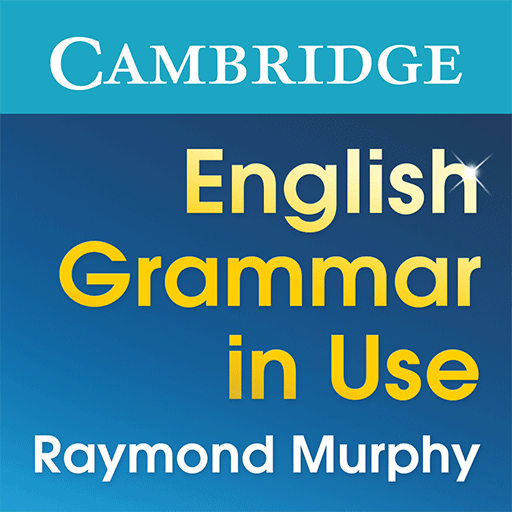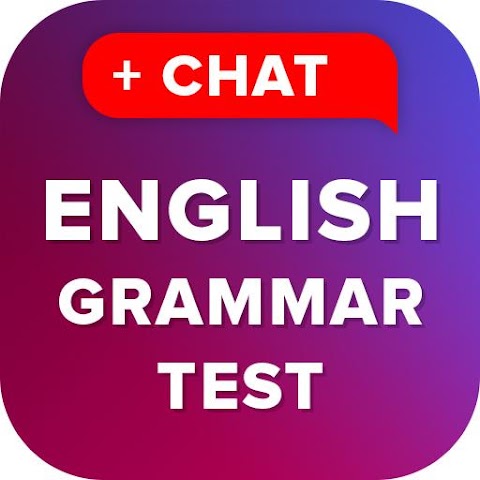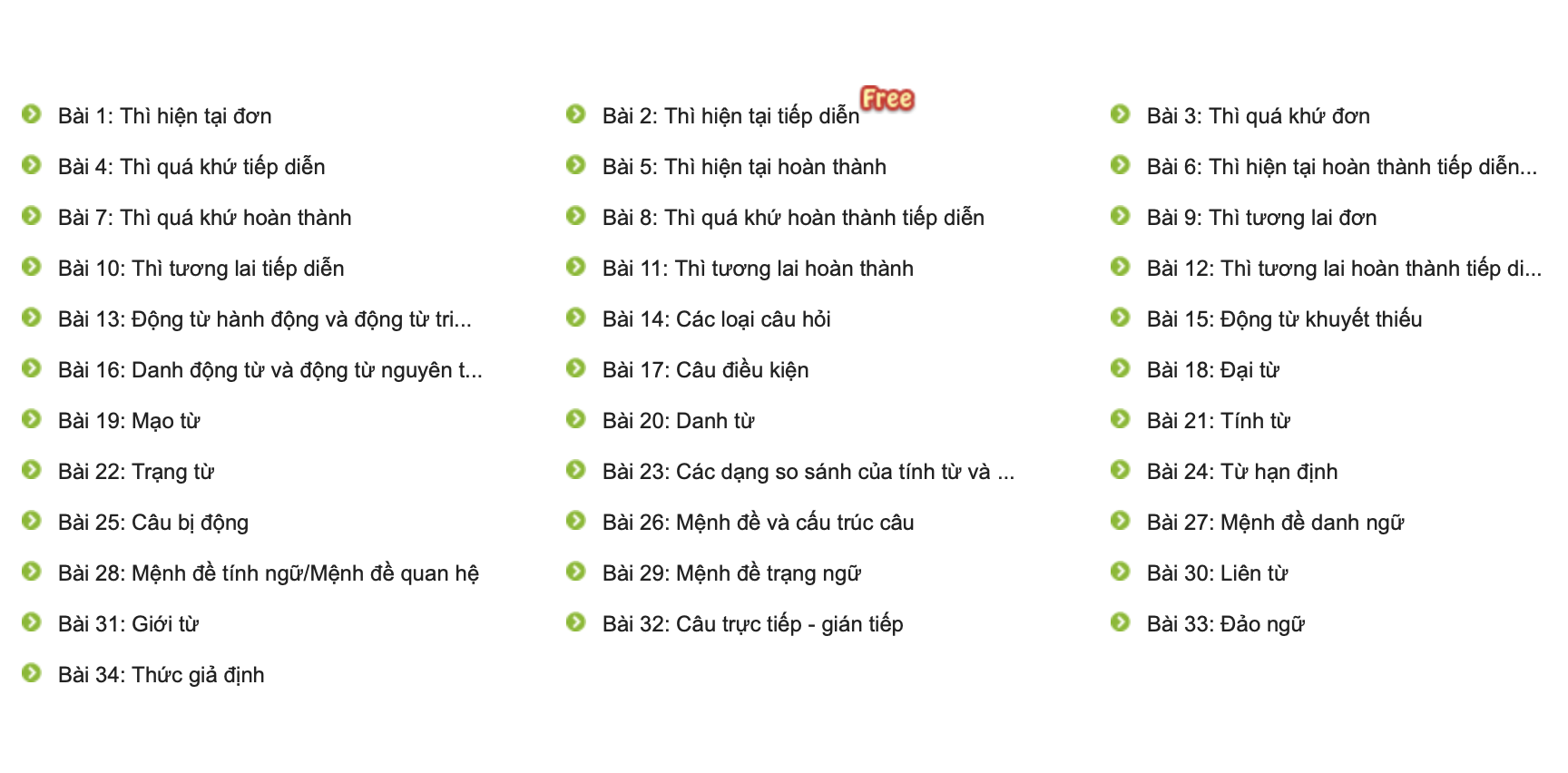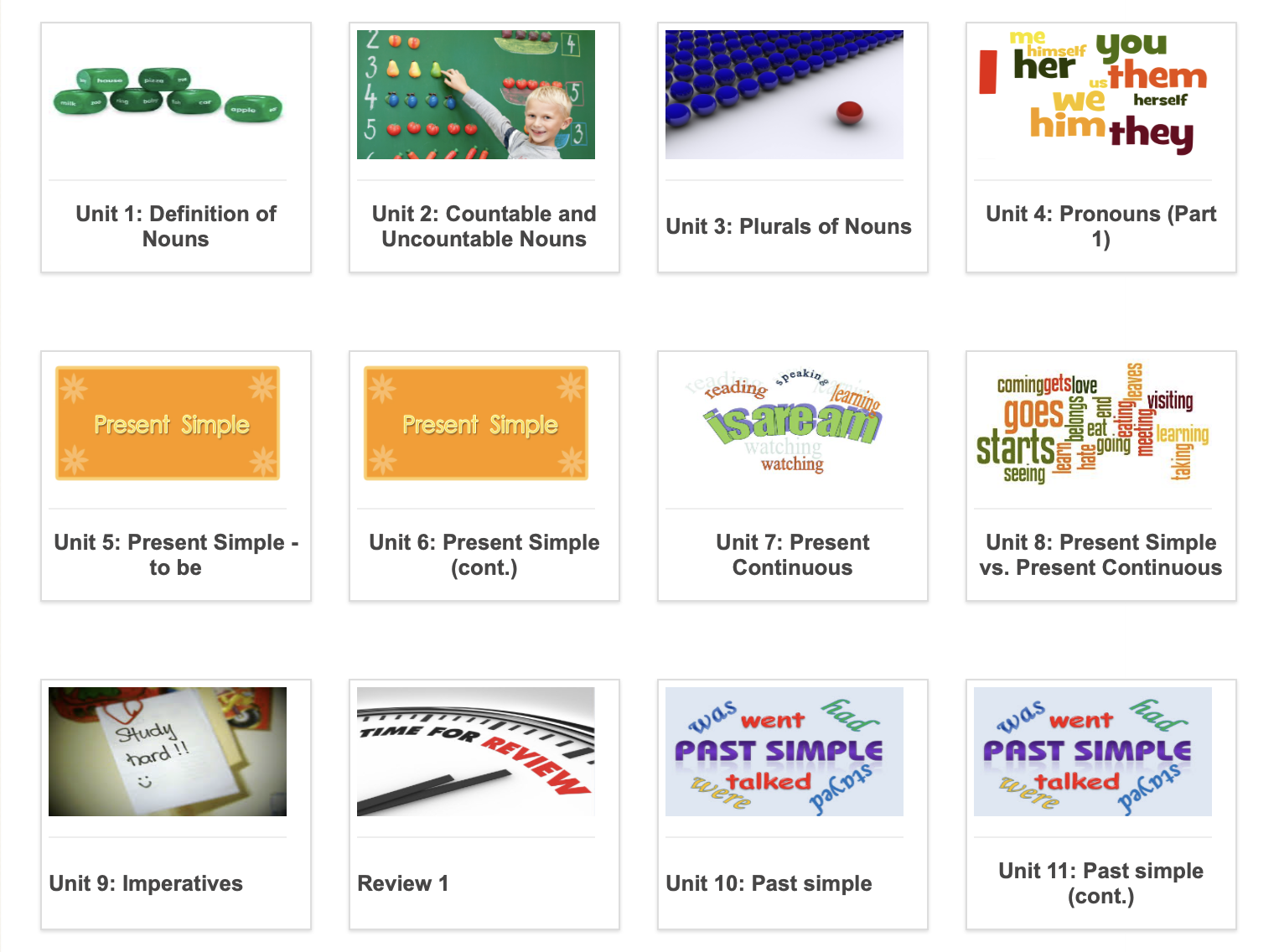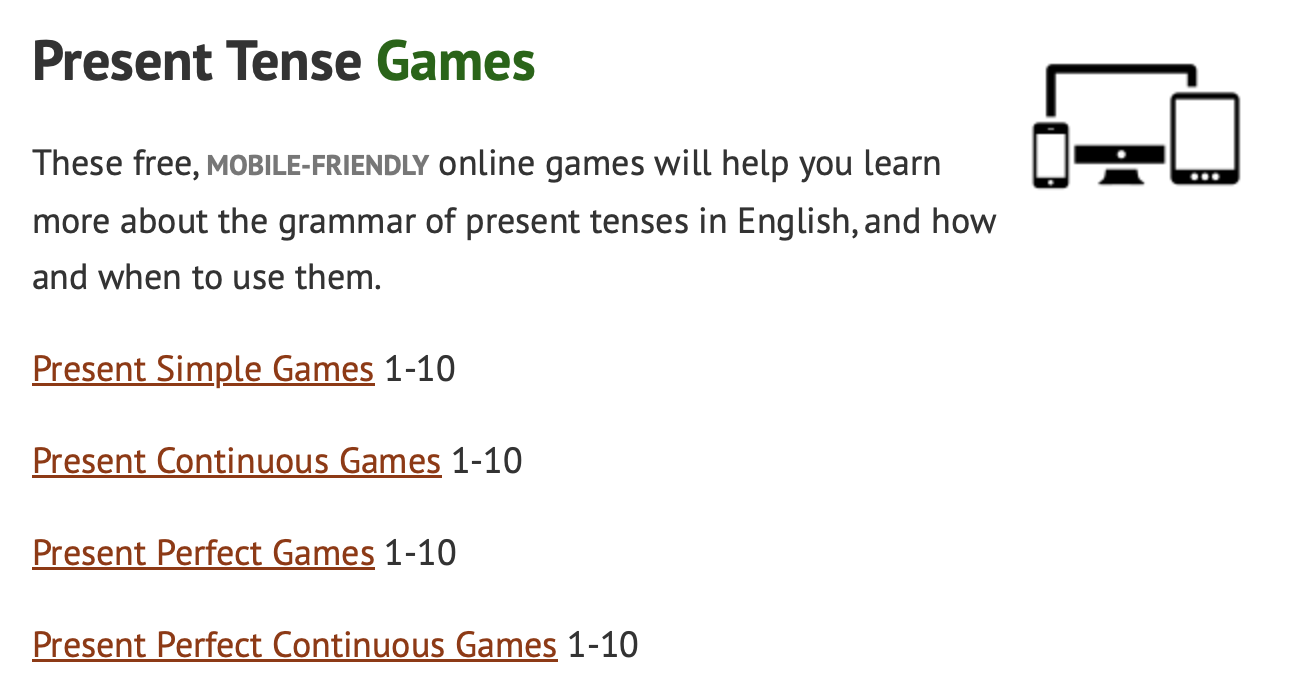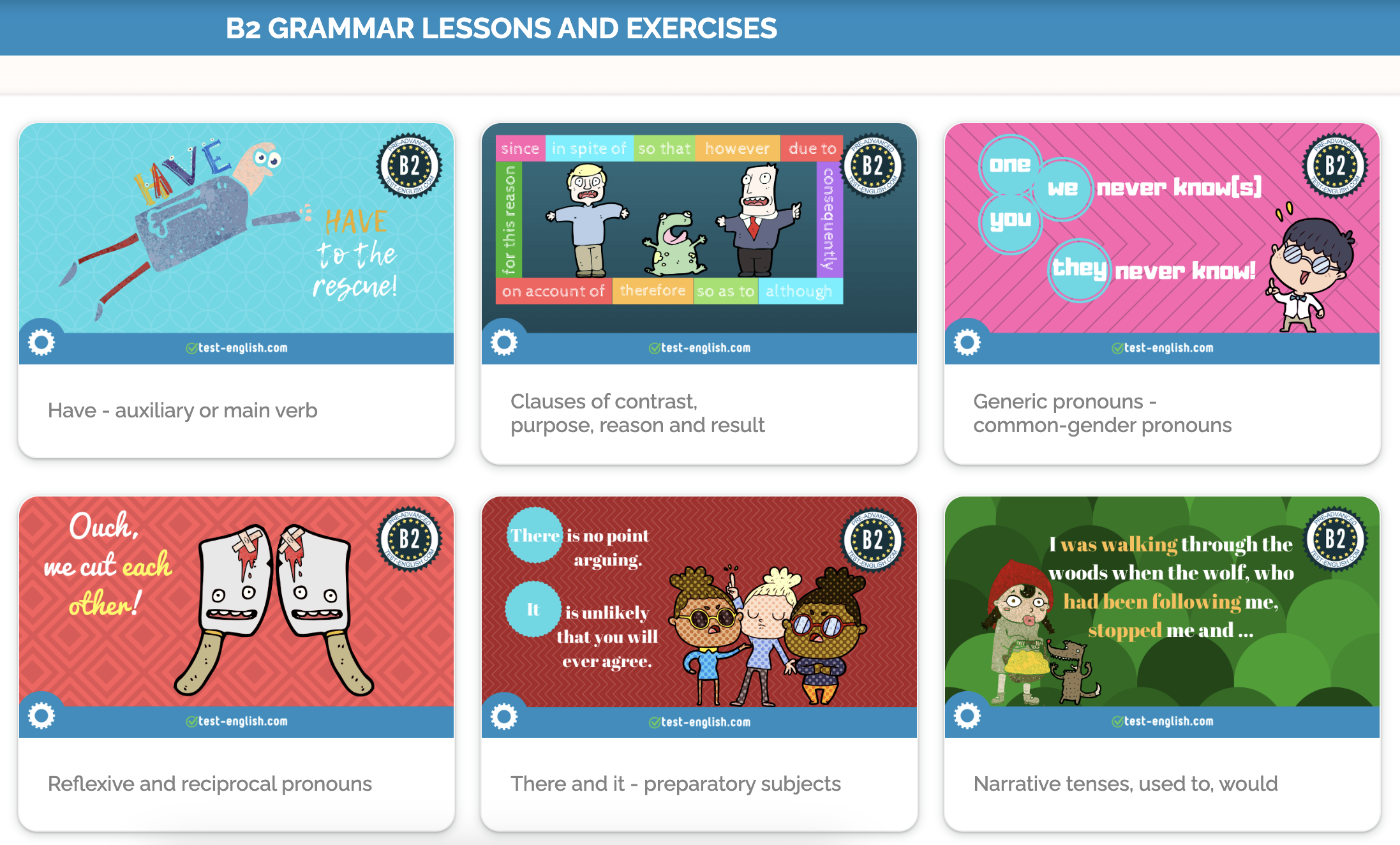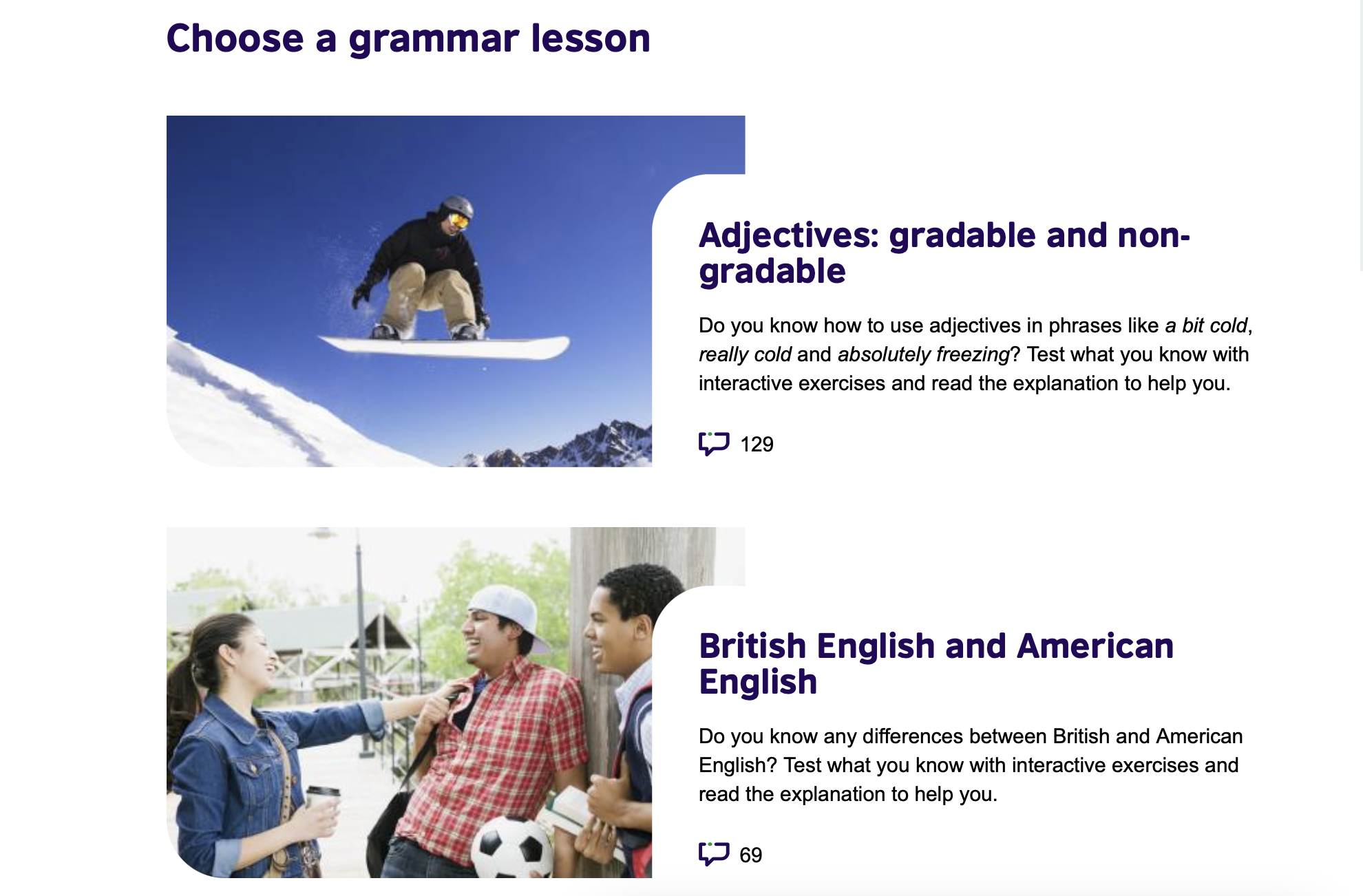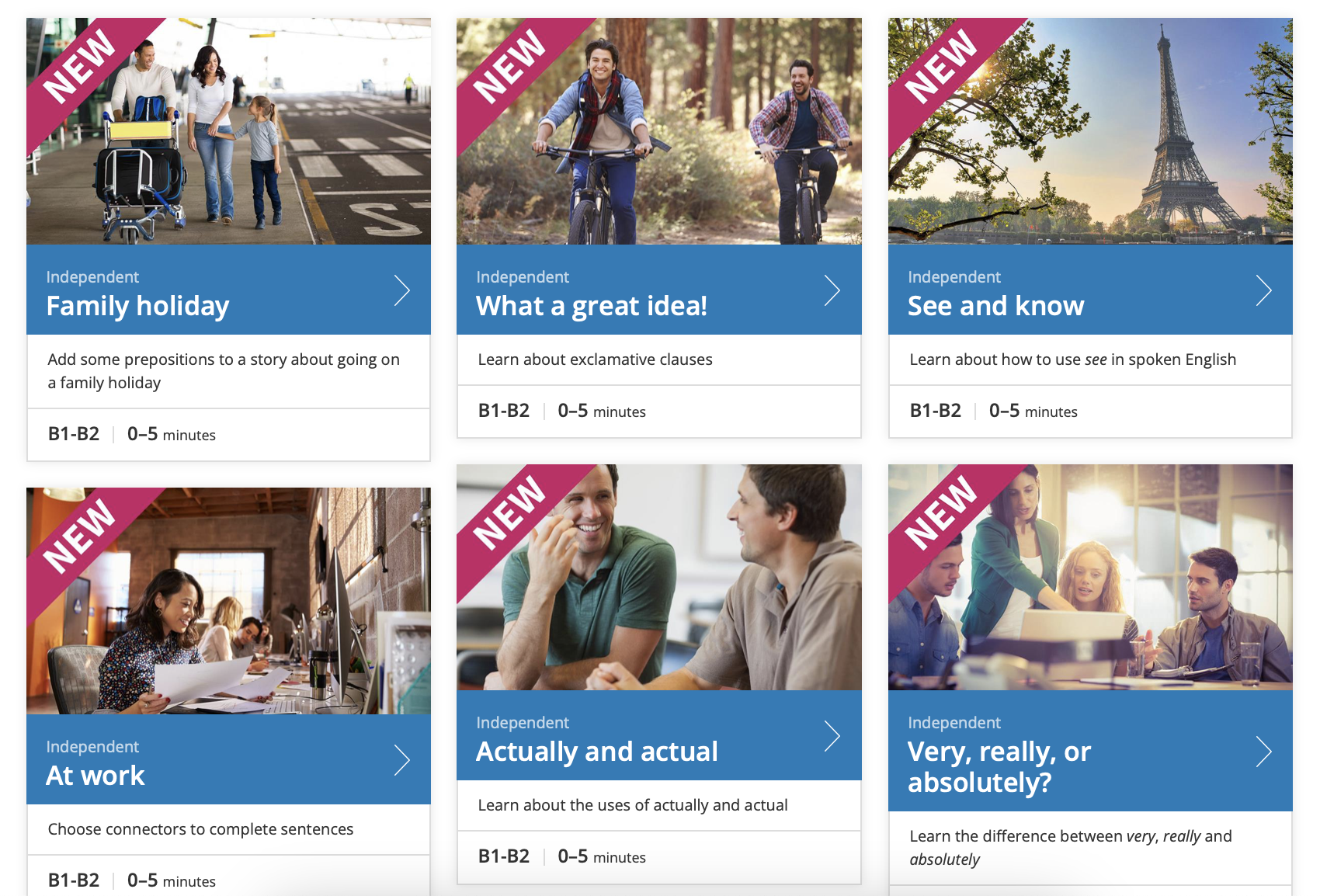English Grammar – B2 Upper-intermediate Level

Vantage
Thể hiện mức độ kiểm soát ngữ pháp tương đối cao.
Không phạm sai lầm dẫn đến hiểu lầm.
Có khả năng sử dụng tốt cấu trúc ngôn ngữ đơn giản và một số dạng ngữ pháp phức tạp, mặc dù có xu hướng sử dụng cấu trúc phức tạp một cách cứng nhắc và đôi khi còn thiếu chính xác.
Let's start below
B2 adjectives and adverbs
- Adjectives with -ed vs -ing i.e. I am interested in your offer. Your offer is interesting.
- Adverbs of frequency – always, never, seldom, sometimes, often, etc.
- Word order of adverbs of frequency i.e. I am never late. I never call people after 10 p.m.
- Comparative and superlative of irregular adjectives i.e. far – further / farther – furthest / farthest
- Same as, the same i.e. Laura gets the same salary as me. You’re just the same as your mother.
- As… as i.e. He isn’t as old as he looks. It’s not as cold.
- Like, alike, slightly, i.e. You look like your mother, They look alike. She is slightly taller than me.
B2 conditionals
- 0 conditional i.e. If you are happy, clap your hands.
- 1st conditional i.e. If it rains, I will stay at home.
- 2nd conditional i.e. If I were you, I would drink more water.
- 3rd conditional i.e. If I had married Paul, I would have lived in that beautiful house.
- Mixed conditional i.e. If I had worked harder at school, I would have a better job now.
- Wish i.e. I wish I was taller. I wish I had done that earlier.
B2 future tenses:
- Will i.e. I am sure she will win the race. I will call you tomorrow.
- Future progressive i.e. I will be taking my nephew to a concert tomorrow.
- Going to i.e. I am going to buy some books.
- Will and going to for prediction i.e. I’m sure you will pass the test.
- Will get used to i.e. I will get used to living in a city eventually.
- Passive voice i.e. The dinner will be cooked by my friend.
- Reported speech i.e. She said she would come for sure.
- Future perfect i.e. Next year we will have been married for ten years.
- Future perfect progressive i.e. You will have been waiting for more than two hours when her plane finally arrives.
B2 gerund and infinitive
- Forming nouns from verbs using – ing i.e. swim – swimming, play – playing
- Verbs followed by gerund such as decide, make me, hate, suggest, remember, think about, prefer, try, etc.
- Verbs followed by infinitives such as think about, make me, hope, advise, manage, mind, etc.
- Verbs followed by bare infinitives such as I’d rather, had better, etc.
- Verbs followed by to + gerund such as help, look forward, etc.
B2 modal verbs:
- may, might for probability i.e. It might rain.
- May, might for polite request i.e. May I see your passport?
- May and might for deduction or speculation i.e. I might look for another job.
- Can, can’t have done i.e. It could have been Sarah last night.
- Can, could for polite request i.e. Can I see your manager? Could you say it again?
- Can for probability i.e. I can come and see you if you like.
- Could for ability i.e. I could ski before I could walk.
- Could for probability i.e. We could see the lake when we kept walking.
- Could for deduction or speculation i.e. It could be far now. It could be easy.
- Must vs have to i.e. I must phone her. I have to work from 8 to 5.
- Have got to i.e. You have got to concentrate.
- Must have done i.e. She must have been asleep when I walked in.
- must/can’t for deduction i.e. She must be a chef. She can’t be a policeman.
- Be able to in past and present perfect i.e. I was able to escape. I haven’t been able to see her in the hospital.
- Be able to for possibility i.e. I might be able to speak English after this course.
- Ought to for obligation i.e. You ought to study more.
- Need for necessity i.e. You need to see a doctor soon.
- Needn’t for obligation i.e. You needn’t go to the staff meetings.
- Need, Needn’t have done i.e. You needn’t have gotten up so early.
- Mustn’t for obligation i.e. You mustn’t go.
- Shall for polite request i.e. Shall we go?
- Shall for suggestions i.e. Shall we invite my mom for lunch?
- Be able to in present, future, past and present perfect for ability i.e. I was able to drive. I will be able to drive. I have been able to drive.
- Should for giving advice i.e. You shouldn’t be here now.
- Should have done i.e. They should have arrived a long ago.
- Would expressing habits, in the past i.e. My dad would read me amazing stories every night at bedtime.
- Reported speech
B2 past tenses:
- Past simple i.e. They watched TV all evening. It began to rain soon after dinner. I didn’t see Jane all evening. Did you meet your friend?
- Past progressive i.e. The telephone rang when she was having a bath. She was wearing trousers yesterday.
- Past perfect i.e. She found the keys she had lost.
- Past perfect progressive i.e. We had been playing tennis all evening.
- Used to i.e. She used to play football as a kid.
- Was used to, got used to in all forms i.e. She was used to talking to her family on the phone.
- Had something done i.e. I had my hair cut.
- Passive voice of all past tenses i.e. The promise was broken. The office was cleaned every day.
- Reported speech i.e. She said she wanted to buy a car.
- Past tenses used for narration
- All irregular verbs
B2 prepositions:
- Prepositional phrases with in, for, from, to, at, to, in, about, with, from, of, etc.
- Among, Until, On, At, In, In case, By, Of, With, About, To, For, About, From, Out of
B2 present tenses:
- Present simple i.e. Mark usually plays football on Sundays.
- Stative verbs i.e. like, prefer, understand, want, need, know, mean, believe, remember, forget
- Present simple for future i.e. The train leaves at 8. The bank closes at 4.
- Present progressive i.e. Please be quiet, I am working.
- Present progressive for future i.e. I am seeing my sister tomorrow.
- Present progressive with always i.e. She is always screaming.
- Present perfect with for, since, yet, already, never, ever, just, recently, etc.
- Present perfect progressive i.e. I have been working for Jane for seven years now.
- Passive voice of all present tenses i.e. Hamlet was written by Shakespeare. The sweater is made of wool.
- Reported speech i.e. She said she was happy.
- Is used to, get used to in all present tenses i.e. I used to live in a city. You can get used to living in a village.
- To have something done i.e. I have had my hair cut.
B2 pronouns:
- Pronouns: something, anything, someone, anyone, something, anything, somewhere, anywhere, etc.
- Reflexive pronouns: myself, himself, herself, himself, ourselves, yourself, themselves
- Relative pronouns used for relative clauses: which, who, whose, whom, that, where, when, etc.
B2 questions:
- Complex question tags i.e. I’m going to get an email with the details, aren’t I?
- Wh- questions i.e. How long ago etc.
- Auxiliary verbs: either, neither, So do I, I hope so, etc.
Học một ngôn ngữ mới là một quá trình lâu dài để tiếp thu kiến thức và trau dồi kỹ năng. Chỉ cần chăm chỉ học tập và rèn luyện mà không quá tập trung vào các kỳ thi vì điểm số chỉ là kết quả hiển nhiên của sự tiến bộ không ngừng. Chỉ cần tập trung vào việc học như thế nào để có thể sử dụng ngôn ngữ một cách trôi chảy và tự tin. Vậy nên, hãy bắt đầu học bất cứ gì quý vị thích dưới đây và kiên trì thực hành.
Videos
52 videos
61 videos
59 videos
62 videos
20 videos
19 videos
92 videos
16 videos
APPS
Người học có thể đồng hành một số ứng dụng để có động lực và duy trì quá trình học mỗi ngày. Quý vị có thể tải app từ CH Play hoặc App store.
English Grammar in Use
Ứng dụng bao gồm kiến thức lý thuyết đi kèm với bài tập thực hành, phát triển bởi Đại học Cambridge dựa trên cuốn sách cùng tên của tác giả Raymond Murphy.
Magoosh Grammar
Nhằm mục đích chủ yếu là giúp người dùng thuộc kiến thức lý thuyết, Ứng dụng gồm rất nhiều chủ điểm ngữ pháp khác nhau với phương pháp học từ vựng qua flashcard.

